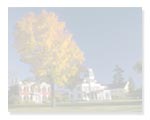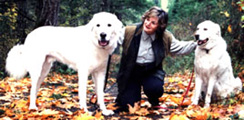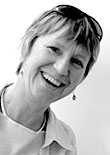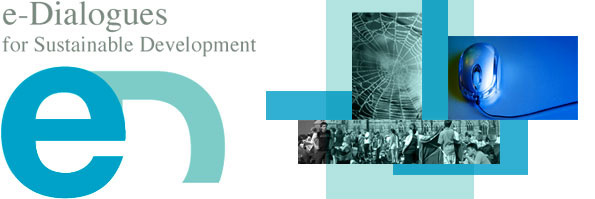Introduction
We are now at a stage in human society where natural and human systems are co-evolving, and their dynamic sustainability (Newman 2005) is interdependent. The continuing decline in ecosystem services shows that communities everywhere need to act now to maintain and enhance these essential services to human life. Human progress may now rely on our ability to deliberatively re-design our communities in new ways (Dale 2001; Dale and Onyx 2005; Cote, Tansey, Dale 2005).
Key to any re-design strategies and ultimately sustainable community development are critical public policy questions about the nature of limits, the meaning of place, issues of scale and diversity. Join Dr. Ann Dale’s Canada Research Chair team as they converse on-line about these four research themes. These dialogues are designed to be informal conversations, brainstorming each of the four research themes and sharing with younger scholars the joys and tensions of interdisciplinary research. Join the on-line audience and pose your own questions to the research team.
Tune in on the third Thursday of every month, starting January 19th, 2006, for vibrant on-line conversations about the meaning of sustainable community development in Canada.
| Part 2: Meaning of Place |
Every community is located in a particular geographic and ecological landscape and possesses unique socio-economic and cultural characteristics.  Place is important in that it determines access to particular types of resources, not the least of which are natural resources, the backbone of the Canadian economy. Clearly, communities everywhere are facing loss of ecological integrity. In addition, globalization has dramatically changed the ability of place-based communities to be 'maitres chez nous'.
Place is important in that it determines access to particular types of resources, not the least of which are natural resources, the backbone of the Canadian economy. Clearly, communities everywhere are facing loss of ecological integrity. In addition, globalization has dramatically changed the ability of place-based communities to be 'maitres chez nous'.
Some of the key questions the CRC research team will be talking about include what are the critical geophysical characteristics necessary to continuing community development? What are the critical ecological foundations to be sustained? How are community demographics changing our sense of place?
|
Part 2: Place Panelists
|
 Dr. Ann Dale, Trudeau Fellow
Dr. Ann Dale, Trudeau Fellow
Professor, School of Environment and Sustainability, Royal Roads University
Faculty of Social and Applied Sciences
Canada Research Chair on Sustainable Community Development
Dr. Dale is a rare hybrid, both an academic and an activist. Currently she is engaged in two major research initiatives at Royal Roads University. First, she is leading the e-Dialogues for Sustainable Development, a series of online dialogues exploring critical issues using the power of the internet to influence public policy. Second, she is working on exploring the relationship between social capital and sustainable community development. In 2001, she received the Policy Research Initiative's Outstanding Research Contribution Award for her most recent book, At the Edge: Sustainable Development in the 21st Century.
 Dr. Lenore Newman is a writer, teacher and researcher living in Ottawa. She grew up in a small coastal community in British Columbia and has a long standing interest in the environment. Lenore has a background in physics, complex systems theory, human geography, social change, and sustainability. Her doctorate is from York university; it examined theoretical aspects of sustainability in rapidly changing societies. Her research interests include sustainability at the community level and sustainable technology including biomimicry, the modeling of technology upon ecological systems.
Dr. Lenore Newman is a writer, teacher and researcher living in Ottawa. She grew up in a small coastal community in British Columbia and has a long standing interest in the environment. Lenore has a background in physics, complex systems theory, human geography, social change, and sustainability. Her doctorate is from York university; it examined theoretical aspects of sustainability in rapidly changing societies. Her research interests include sustainability at the community level and sustainable technology including biomimicry, the modeling of technology upon ecological systems.
Lenore is also interested in virtual communities, ecological effects of globalization, and the politics of gender. When Lenore is not on-line, she is likely outdoors.
 Dr. Levi Waldron is a post-doctoral fellow living in Toronto, Ontario. He grew up in the interior of British Columbia, where he completed grade 7 by a combination of home schooling and a one-room elementary school. He went on to UBC for a B.Sc. in physics, then to the University of Waterloo for a M.Sc. in physics, doing quantum calculations of hydrogen molecular spectra. At this point, his growing interest in and concern for the environment led him to complete a Ph.D. in forestry and environmental studies at the University of Toronto, modeling the leaching of wood preservatives from pressure-treated wood. Levi has many research interests including global warming, transportation, implementing sustainability at the community level, and open-source software and development.
Dr. Levi Waldron is a post-doctoral fellow living in Toronto, Ontario. He grew up in the interior of British Columbia, where he completed grade 7 by a combination of home schooling and a one-room elementary school. He went on to UBC for a B.Sc. in physics, then to the University of Waterloo for a M.Sc. in physics, doing quantum calculations of hydrogen molecular spectra. At this point, his growing interest in and concern for the environment led him to complete a Ph.D. in forestry and environmental studies at the University of Toronto, modeling the leaching of wood preservatives from pressure-treated wood. Levi has many research interests including global warming, transportation, implementing sustainability at the community level, and open-source software and development.
He also enjoys canoeing, bike repair and activism, and generally getting involved in his community.
 Ela Kinowska was born and raised in Poland. Ela immigrated to Canada in 1990. Since her arrival in Canada, she has focused her career on two paths: civil service and photography. As a civil servant she has dedicated her work to the environment and international development, Ela’s assignments included Environment Canada, Foreign Affairs Canada and currently Natural Resources Canada. Ela speaks seven languages and has lived in four countries; she traveled extensively across Europe, Latin America and Africa. As a photographer she has participated in 22 shows in Canada and Europe, her photography has a human focus aiming at documenting the challenges of the present, reflecting on the past and bringing hope for the future; a sample of her images can be viewed at www.elaphoto.com
Ela Kinowska was born and raised in Poland. Ela immigrated to Canada in 1990. Since her arrival in Canada, she has focused her career on two paths: civil service and photography. As a civil servant she has dedicated her work to the environment and international development, Ela’s assignments included Environment Canada, Foreign Affairs Canada and currently Natural Resources Canada. Ela speaks seven languages and has lived in four countries; she traveled extensively across Europe, Latin America and Africa. As a photographer she has participated in 22 shows in Canada and Europe, her photography has a human focus aiming at documenting the challenges of the present, reflecting on the past and bringing hope for the future; a sample of her images can be viewed at www.elaphoto.com
Ela lives in Ottawa with her husband Ryszard and two children, Sonia and Alexander.
